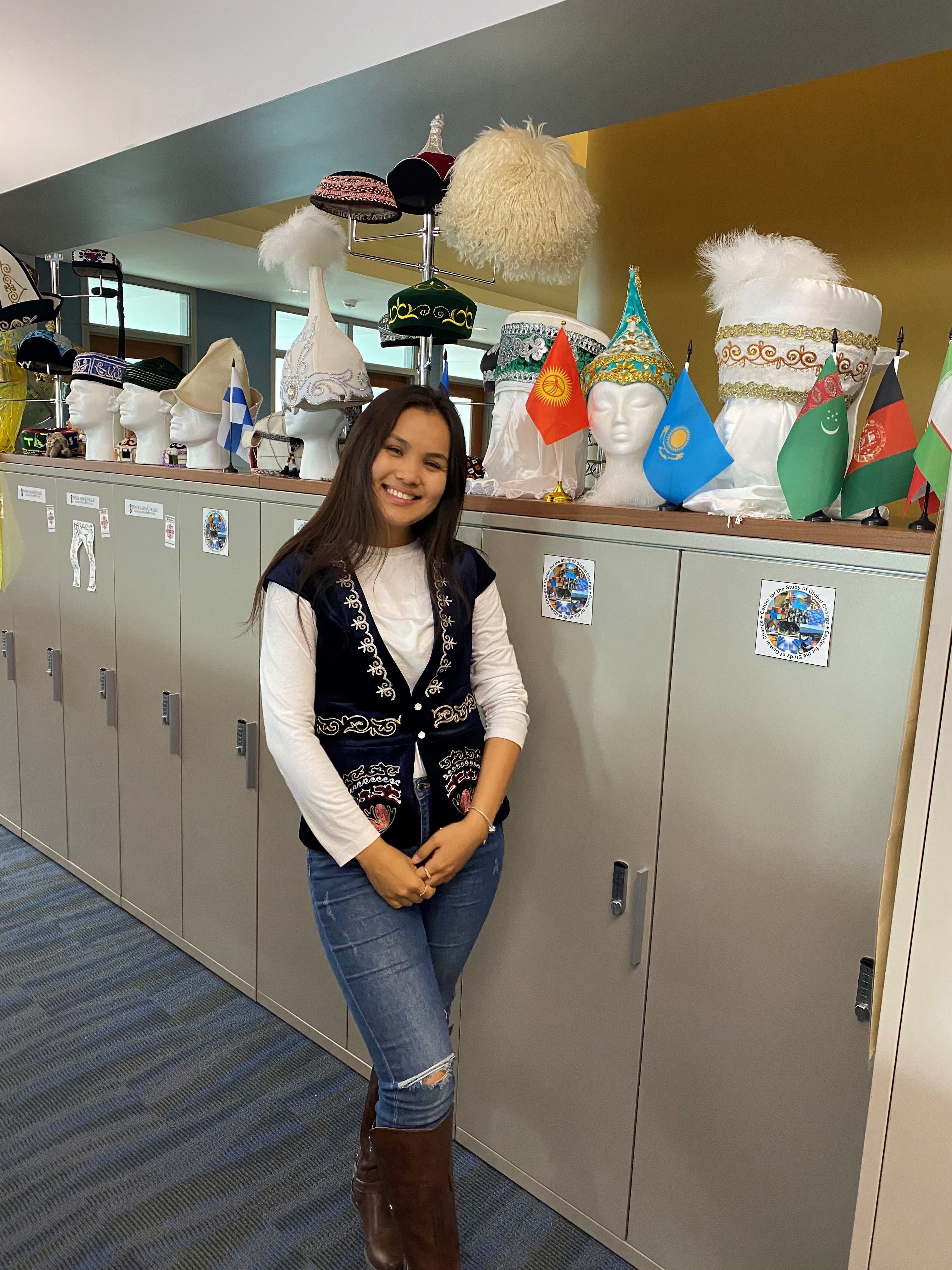Can you introduce yourself briefly and tell us a little about your background?
My name is Orazbayeva, Moldir Galymzhankyzy. I’m from Kazakhstan, and I’m here as a Kazakhstan FLTA. I got my Bachelor’s in Kazakhstan, and my Master’s in China, with a Chinese governmental grant from Qingdao University. Last year, I was a teacher of English and Chinese at Karaganda State University.
How many sections of Kazakh are you teaching? How many students? Why learn Kazakh?
I have two sections: introductory, and intermediate, with a total of five students. I’m very excited, because they want to learn about my culture and my language, and it’s a pleasure involving them in my culture.
Students should learn Kazakh because Kazakhstan is a developing country with big opportunities, and it’s a big opportunity for Americans to earn the respect of Kazakh people -- it’s a big deal to get our respect, and you have to earn it!
Classes in the US:
I am taking a psycholinguistic class with Ann Bunger, and a class in teaching less commonly taught languages with Antonia Schleicher. I am really interested in linguistics; I am a person who knows a lot of languages, and I’m very interested in how I learn them, and why some people acquire languages faster than others.
I think the biggest difference between taking classes here and in Kazakhstan is that, here, there is more freedom to say or ask what you want, and the professor will usually accept it. In Kazakhstan, we don’t do that; the professor will usually explain everything to us, not the other way around. It’s very interesting that here, sometimes, professors will say, “you can find out for yourself, and then tell us!”
Is this your first time in the US?
Yes, this is my first time ever in the United States. I love it! It’s interesting to live here, because everybody smiles a lot, everybody opens the door for you and says “please” and “have a nice day.” In Kazakhstan we don’t really say that; we just say “hello” and “goodbye.” For people that we don’t know, we don’t wish them a good day or a good evening or anything like that, so it was surprising to me that everybody is so polite here.
Is there anything you miss from Kazakhstan?
I miss my family –
I miss my mom, my dad, and my little brother and sister. Family is the most important thing to me, and I wish they could visit, because I would love to show them everything. I talk with them every day, and we drink tea together, while they’re having breakfast and I’m having dinner. There are also a lot fewer Kazakh people here, so I miss that.
Favorite thing to do?
I really love that I live near the Recreational Sports Center – I’ve been doing yoga, and I swim every week.
Is there anything you’d like the readers to know about Kazakhstan?
If you come to Kazakhstan, you’ll find everything you want: we have mountains, seas, national forests, deserts, everything. And we have almost all of the elements! It’s a very diverse place: our big cities are very beautiful and modern, and our rural areas are very hospitable. You can always feel the hospitality of Kazakh people; it’s a big deal in Kazakhstan, and a big part of our culture. Also, the word “Kazakh” means nomad--we are descended from nomads, and our nomad culture is very important to us.
Do you think learning Kazakh is difficult for an English speaker?
Yes, I think it’s really hard! Our alphabet is Cyrillic, and we have specific sounds that some English speakers can’t produce, so often English-speakers are shy. But practice will help!
Even the structure, subject-object-verb, not subject-verb-object, is difficult for English-speakers. But my students are so linguistically gifted, and I’m very proud. Everybody is so curious, and it’s so fantastic.
Advice for learning languages?
When I was learning English and Chinese, I watched a lot of talk shows, to see how people make sounds, or how they express emotions, because each language has its own emotions. I also really like to listen to podcasts, because they’re informative and they improve my listening skills. I also read a lot of books in English, because I love to read classics in their original language. In translation, things sometimes lose their meaning, and sometimes the translations aren’t that good. I read a lot of Charles Dickens, Mark Twain, Agatha Christie and Oscar Wilde. And I love The Phantom of the Opera! When you read things in the original, it’s totally different. So that’s how I’ve improved my language. But in Kazakh, when you read a classic book, it’s very difficult, because we have a lot of old words that we don’t really use anymore. Even for Kazakh people, it’s hard to understand.
Fun or interesting phrase:
We have the same words for saying, “goodbye”, and when someone sneezes. So when someone sneezes, you have to immediately say, “сау бол (sau bol),” and it means, “be healthy.” And when you say, “goodbye” to someone, you again say, “сау бол (sau bol).” It’s the same word, with two meanings!


